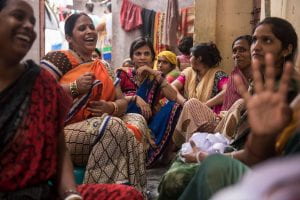Ask an Academic: Professor David Osrin
By By Guest Blogger, on 24 July 2019
Professor David Osrin is Professor of Global Health at UCL and a Wellcome Trust Senior Research Fellow in Clinical Science. Based in Mumbai since 2004, he works in an urban health research collaboration with SNEHA (the Society for Nutrition, Education and Health Action).
Researching within the broad remit of urban health, he is particularly interested in complex social interventions and research ethics, and art and science’s utility in raising public awareness of health. We spoke to David to find out more about his life and work in India…
Can you give us a brief overview of your research in India?
My research has come a long way since I first began working in India in 2004. I started out looking at ways to improve the health of newborn babies in the Mumbai region, working with an excellent organisation called SNEHA. More recently though I’ve been working with organisations like SNEHA to tackle violence against women – an increasingly important issue in India.
I also work closely with the Municipal Corporation of Mumbai, the Family Planning Centre of India, and other health professionals in the area.
What got you interested in the subject in the first place?
When I first began working here, I noticed how committed and passionate everyone was about improving public health in India. It was this passion which inspired me to pursue my research to the extent that I have.
While public health has been an issue for a long time, it’s only in the last decade that violence against women has been a mainstream topic in India. Thanks to a number of landmark legal cases the Government has begun to take the issue much more seriously, and I’m so pleased our research techniques are being used to make a difference.
What difference do you hope it will make?
My vision is to contribute to a social transformation that is taking place throughout the world with respect to equality. In the case of India, my hope is that it will continue to lead to a reduction in violence against women. One of the things that stands out for me is that when we bring the local community together, anything is possible!
Can you tell us about the Institute’s relationship with India?
The Institute of Urban Health is not the only part of UCL working in India of course, and there are other colleagues at the Institute doing great work here too. Together with our partners, we’ve succeeded in engaging state level government in India to bring about some significant policy changes. As well as the work I’ve been doing there, Dr Audrey Prost has also achieved some great results with another Indian NGO called Ekjut – on improving the health and nutrition of new born children and adolescents.
What can UCL learn from your time working in India? What can the UK learn?
Aside from collaborating with people with a different background and outlook to my own, I’ve seen the power when communities come together to tackle societal challenges like public health. Legal intervention, emotional support and shelter are needs that we all share, so what we learn in India can be applied to the UK and vice versa.
What are some of your highlights from living in India?
Having being involved in some hugely important and large-scale research projects, in true collaboration with equal partners, to deliver world-class research.
I’m proud of the fact that during my time here we’ve seen the transformation of countless individuals. I’m also really proud of the public engagement work we’ve done, bringing together the disciplines of health, art and science, which led to a hugely successful festival called Dharavi (or Alley Galli) Biennale.
What has it been like working in the Indian slums?
I am very privileged to spend my working days in an informal settlement but not to live there. Not everyone has that privilege. The impact on me has been profound, and the importance I place on certain things is very different now to when I was living in the West.
The challenges associated with finding clean water, a shelter to withstand the elements, and the need for electricity have all given me a greater appreciation of the basic health and wellbeing needs we all share.
What would you like to say to other academics at UCL thinking of collaborating with others in India?
I think they should absolutely collaborate here if they can. In my view, the academic and research capability of teachers in India is on a par with the UK. Also, I’ve never experienced being hampered by the government structures in place in India. In fact, quite the opposite.
The number of people who are willing to participate in the research has also been incredibly valuable for my research. There’s a lot of enthusiasm in India among the public for taking part in research – perhaps more so than the UK.
It goes without saying that the intercultural interaction which informs my research has also enhanced my experience here.
One Response to “Ask an Academic: Professor David Osrin”
- 1
 Close
Close



Can you kindly ask Professor Osrin if he is the same David Osrin mentioned as the winner of a Jackanory writing competition in Wikipedia on 18th October 1968, with a story called The Bathing Boxer Jumped – https://en.wikipedia.org/wiki/List_of_Jackanory_episodes .
If he is, he may find this link of interest.
Kind Regards,